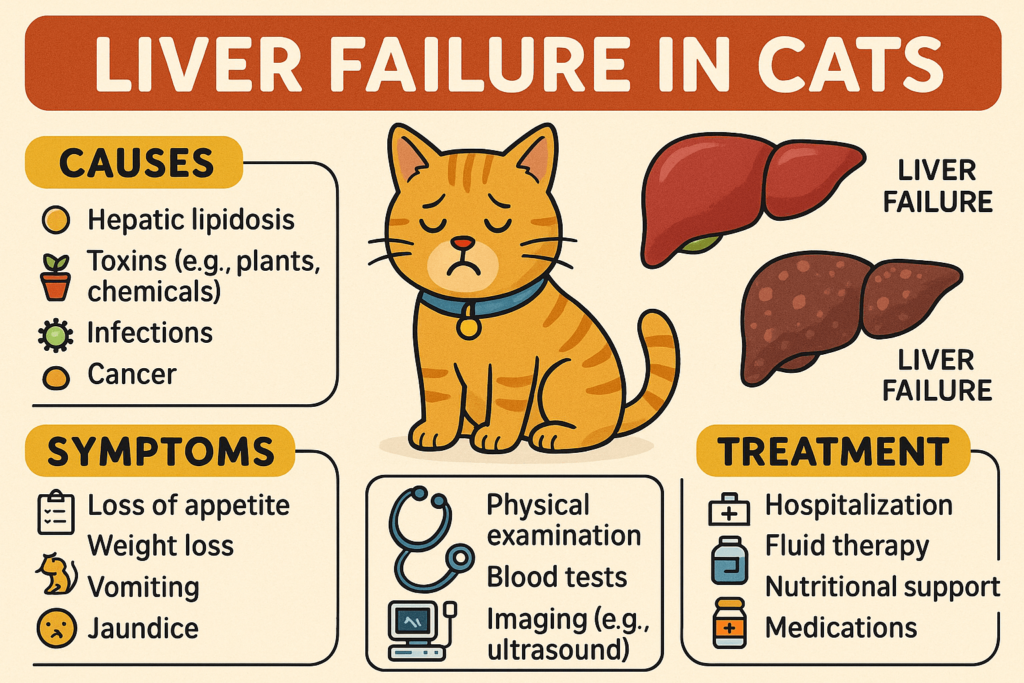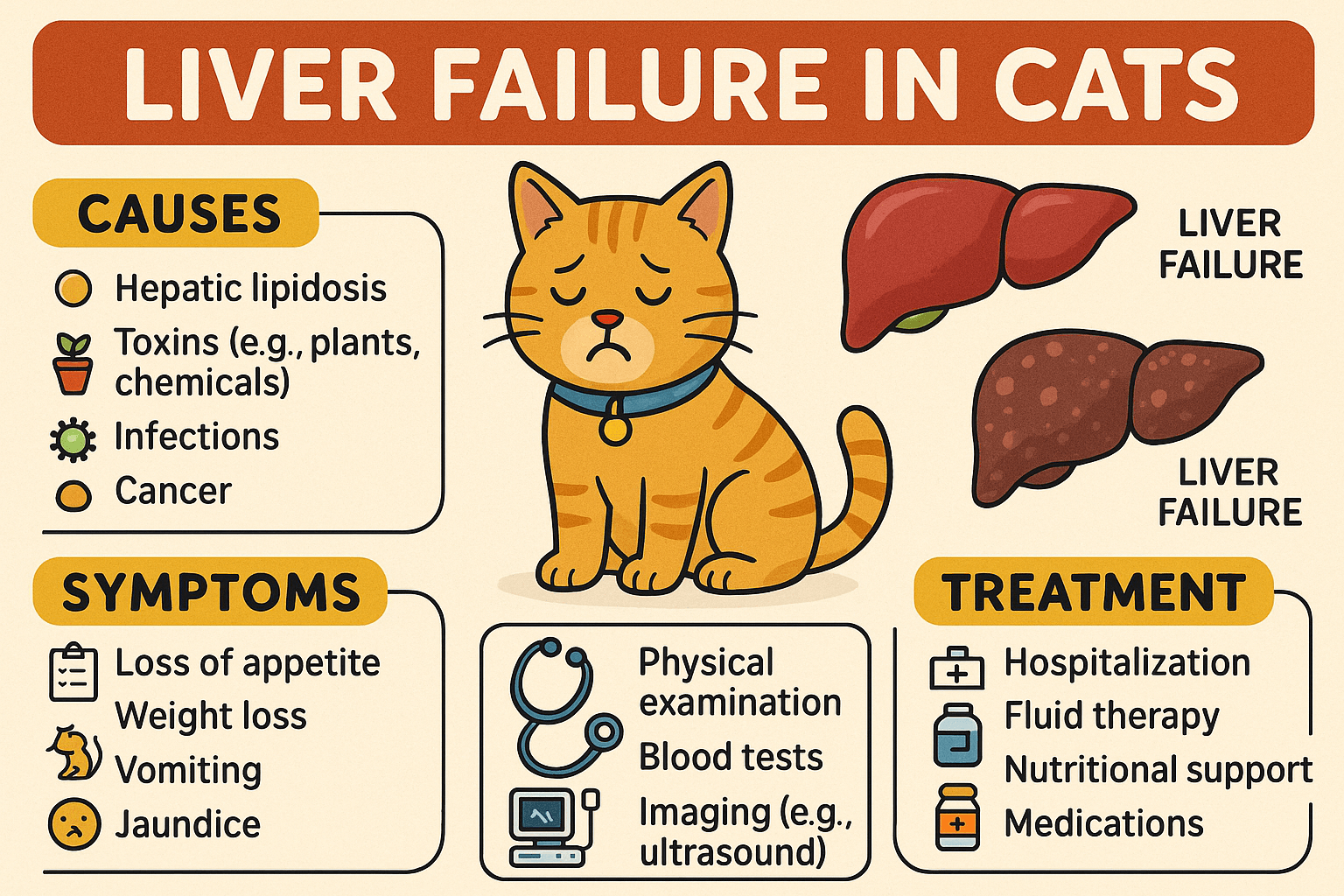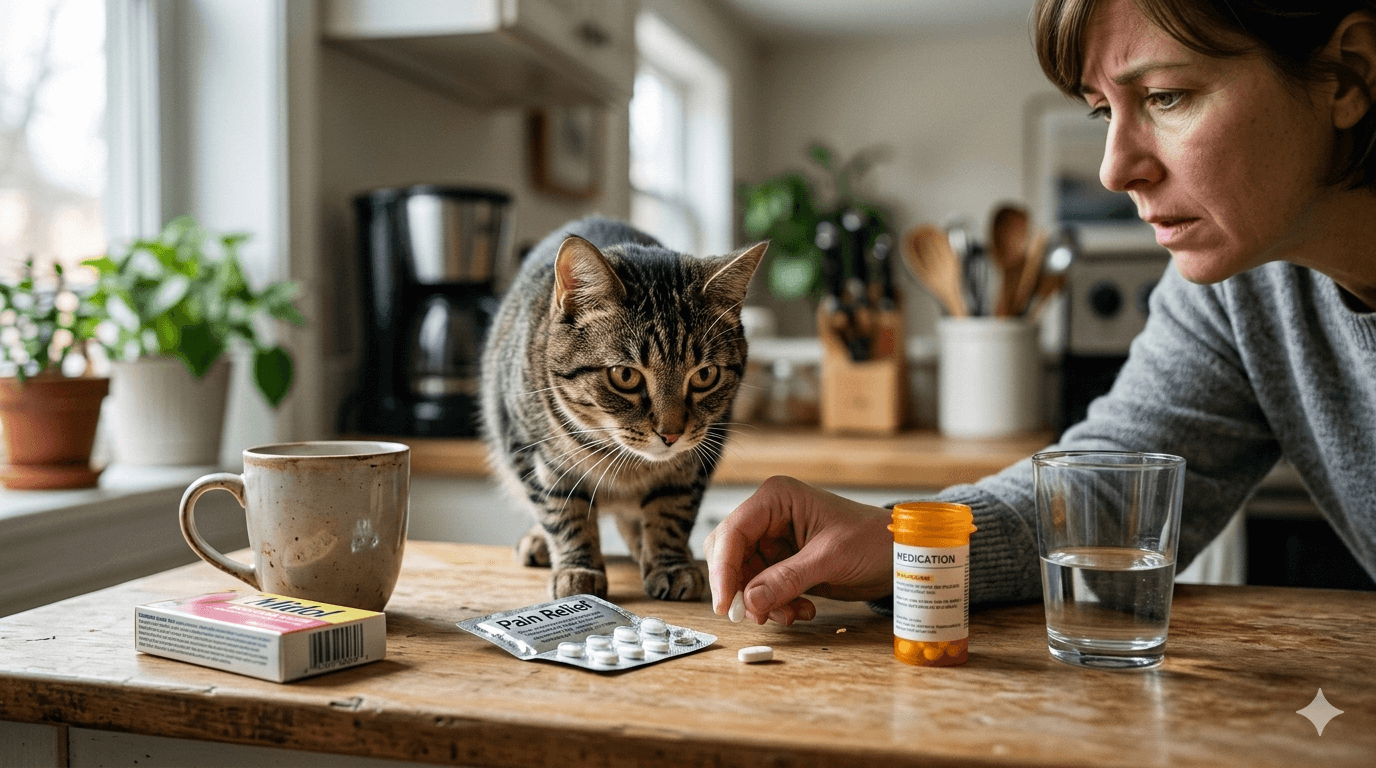Liver Failure in Cats: Understanding the Silent Threat
Liver failure in cats is a serious and potentially life-threatening condition that requires prompt attention. The liver plays a vital role in your cat’s body, supporting digestion, detoxification, and overall health. When this essential organ begins to fail, it can lead to a cascade of complications that affect nearly every system in your cat’s body. Liver issues may develop suddenly (acute) or progress over time (chronic), making early detection and treatment critical. In this blog post, we’ll explore the causes, symptoms, and management of liver failure in cats, empowering you to recognize warning signs and provide the best care possible for your feline companion.
Expert Insight: The Liver’s Vital Role in Feline Health
“The liver has a wide range of functions in the body, playing a key role in the processing of food after it’s been absorbed from the intestines, as well as being involved in the processing of the waste products and metabolites that are produced during the body’s normal functioning.”
Common Causes of Liver Failure in Cats
Liver failure can arise from a variety of underlying conditions, each requiring specific attention. Understanding these causes helps cat owners take preventive measures and seek timely veterinary care.
Hepatic Lipidosis (Fatty Liver Disease):
This condition occurs when excessive fat accumulates in the liver, often triggered by prolonged anorexia or rapid weight loss. It’s one of the most common causes of liver failure in cats.Infections:
Bacterial, viral, or parasitic infections can damage the liver, impairing its ability to function properly. Feline infectious peritonitis (FIP) is a notable example.Toxins and Poisons:
Exposure to household chemicals, medications, or toxic plants can overwhelm the liver, leading to acute failure.Cholangiohepatitis:
This inflammatory condition affects the bile ducts and liver tissue, commonly seen in cats with chronic digestive issues.Cancer:
Liver tumors, whether benign or malignant, can compromise liver function and lead to failure if left untreated.
By identifying potential triggers and addressing them early, you can reduce the risk of liver failure and ensure your cat stays healthy.

Signs and Symptoms of Liver Failure in Cats
Recognizing the symptoms of liver failure is crucial for early intervention. While some signs may seem subtle, they often indicate a deeper issue that requires veterinary attention.
Jaundice (Yellowing of Skin and Eyes):
A yellowish tint to your cat’s gums, eyes, or skin is a classic sign of liver dysfunction and should never be ignored.Lethargy and Weakness:
Cats with liver issues often appear unusually tired, reluctant to move, or less interested in their surroundings.Loss of Appetite:
A sudden refusal to eat is a red flag, as poor nutrition can worsen liver conditions like hepatic lipidosis.Vomiting and Diarrhea:
Digestive upset is common in cats with liver problems, often accompanied by nausea or drooling.Weight Loss:
Unexplained weight loss, especially when combined with other symptoms, may signal advanced liver disease.
If you notice any of these signs, consult your veterinarian immediately to determine the underlying cause and begin treatment.
Check this guide 👉Can Cats Eat Turkey Liver? Best 7 Expert Tips!
Check this guide 👉Liver Disease in Cats: Best 7 Expert Tips!
Check this guide 👉Can Cats Eat Chicken Liver? Best 7 Expert Tips!
Preventive Measures for Liver Health | Warning Signs of Liver Issues |
|---|---|
Provide a balanced, species-appropriate diet | Jaundice (yellowing of gums or eyes) |
Avoid exposure to toxins and poisons | Lethargy and lack of energy |
Schedule regular vet check-ups | Persistent vomiting or diarrhea |
Encourage hydration with fresh water | Sudden loss of appetite |
Monitor for unusual behavioral changes | Unexplained weight loss |
Treatment Options for Liver Failure in Cats
While liver failure is a serious condition, there are several treatment options available depending on the underlying cause and severity. Early intervention significantly improves outcomes.
Fluid Therapy:
Administering fluids intravenously helps combat dehydration and flush toxins from the body, supporting liver recovery.Nutritional Support:
Feeding a high-calorie, easily digestible diet is essential, especially for cats with hepatic lipidosis who may require a feeding tube.Medications:
Antibiotics, anti-inflammatory drugs, or medications to manage nausea and vomiting are often prescribed to alleviate symptoms.Addressing Underlying Causes:
Treating infections, removing tumors, or eliminating toxins can help restore liver function and prevent further damage.Monitoring and Follow-Up Care:
Regular blood tests and veterinary check-ups ensure the liver is healing and allow adjustments to the treatment plan as needed.
With proper care and veterinary guidance, many cats can recover or maintain a good quality of life despite liver challenges.
How to Support Your Cat at Home During Recovery
Recovery from liver failure requires ongoing care and attention at home. These tips can help you create a supportive environment for your cat’s healing journey.
Provide a Stress-Free Environment:
Minimize noise and disturbances to help your cat rest and recover comfortably.Encourage Eating Small Meals:
Offer small, frequent meals to prevent overwhelming the digestive system and encourage consistent nutrition.Monitor Water Intake:
Ensure your cat has access to fresh water at all times to stay hydrated and support liver function.Administer Medications as Directed:
Follow your veterinarian’s instructions carefully to avoid complications or side effects.Watch for Changes in Behavior:
Report any new or worsening symptoms to your vet promptly, as they may indicate a need for adjusted treatment.
By providing attentive care at home, you play a crucial role in your cat’s recovery and long-term well-being.
Preventing Liver Failure Through Diet
A balanced diet plays a pivotal role in maintaining liver health and preventing liver failure in cats. Here are some dietary tips to consider:
Feed High-Quality Protein:
Cats need protein for muscle maintenance, but excessive amounts can strain the liver. Opt for moderate, high-quality protein sources.Limit Fat Intake:
High-fat diets increase the risk of hepatic lipidosis, especially in overweight cats. Choose low-fat options for better liver health.Include Essential Nutrients:
Taurine, vitamin E, and antioxidants support liver function and should be included in your cat’s diet.Avoid Human Foods:
Many human foods, such as onions, garlic, and dairy, are toxic to cats and can harm the liver. Stick to cat-specific formulas.Consult Your Vet for Special Diets:
Prescription diets designed for liver health may be necessary for cats with existing conditions.
A thoughtful approach to nutrition can significantly reduce the risk of liver-related issues in cats.
Understanding Diagnostic Tests for Liver Issues
Diagnosing liver failure involves a combination of tests to pinpoint the cause and assess the severity. Familiarizing yourself with these procedures can prepare you for discussions with your vet.
Blood Tests:
Liver enzyme levels (ALT, ALP) and bilirubin are measured to evaluate liver function and detect abnormalities.Ultrasound Imaging:
An ultrasound provides detailed images of the liver, helping identify tumors, inflammation, or structural changes.Biopsy:
A small sample of liver tissue may be taken for analysis to confirm diagnoses like cancer or cholangiohepatitis.Urinalysis:
Examining urine can reveal signs of infection, toxins, or metabolic imbalances affecting the liver.X-Rays:
X-rays help rule out other conditions and assess the size and shape of the liver.
Understanding these diagnostic tools ensures you’re informed and ready to collaborate with your vet for accurate results.
Coping with Emotional Challenges as a Cat Owner
Dealing with liver failure in your cat can be emotionally taxing, but there are ways to manage stress and stay strong during this difficult time.
Educate Yourself:
Learning about your cat’s condition reduces fear of the unknown and helps you make informed decisions.Seek Support from Friends or Groups:
Connecting with fellow cat owners facing similar challenges can provide comfort and advice.Practice Self-Care:
Taking care of your own physical and mental health enables you to be present for your cat.Celebrate Small Wins:
Acknowledge milestones in your cat’s recovery, no matter how minor they may seem.Prepare for End-of-Life Discussions:
If the prognosis is poor, discussing palliative care or euthanasia with your vet ensures your cat’s comfort and dignity.
By managing your emotions and focusing on your bond with your cat, you can navigate this journey with strength and compassion.
Frequently Asked Questions About Liver Failure in Cats
Can liver failure in cats be cured?
While some cases can be managed successfully, others may require lifelong care. Early diagnosis and treatment improve outcomes.
What foods should I avoid giving my cat with liver issues?
Avoid high-fat or processed foods, as they can strain the liver. Stick to vet-recommended diets.
Is liver failure painful for cats?
It can cause discomfort, but pain management is part of the treatment plan to keep your cat comfortable.
How long do cats live with liver failure?
Prognosis varies depending on the cause and severity, but many cats can live months to years with proper care.
Can young cats develop liver failure?
Yes, though it’s more common in older cats. Kittens may experience congenital or infectious causes of liver issues.
Empowering Cat Owners to Act Against Liver Failure
Liver failure in cats is a complex and multifaceted condition, but understanding its causes, symptoms, and treatments empowers you to take action. By staying vigilant, seeking veterinary care early, and providing a supportive home environment, you can give your feline friend the best chance at recovery. Remember, your cat relies on you to advocate for their health—regular check-ups and preventive measures go a long way in safeguarding their liver and overall well-being. With knowledge and compassion, you can face this challenge together and ensure your beloved pet enjoys a happy, healthy life.
Can I Give My Cat Midol? Best 7 Expert Tips! – Learn the risks, symptoms, and safe alternatives to keep your cat healthy and avoid toxic reactions.
Can I Give My Dog Midol? Best 7 Expert Tips! – Discover the risks, safe alternatives, and expert advice to keep your dog safe from accidental poisoning.
Maximum Weight for Cats on Planes: Best 7 Expert Tips! – Learn airline policies, tips to stay compliant, and ensure safe travels for your feline friend.
Max Weight for Dogs on Planes: Best 7 Expert Tips! – Discover airline weight limits, safe travel tips, and solutions for flying with your dog stress-free.





